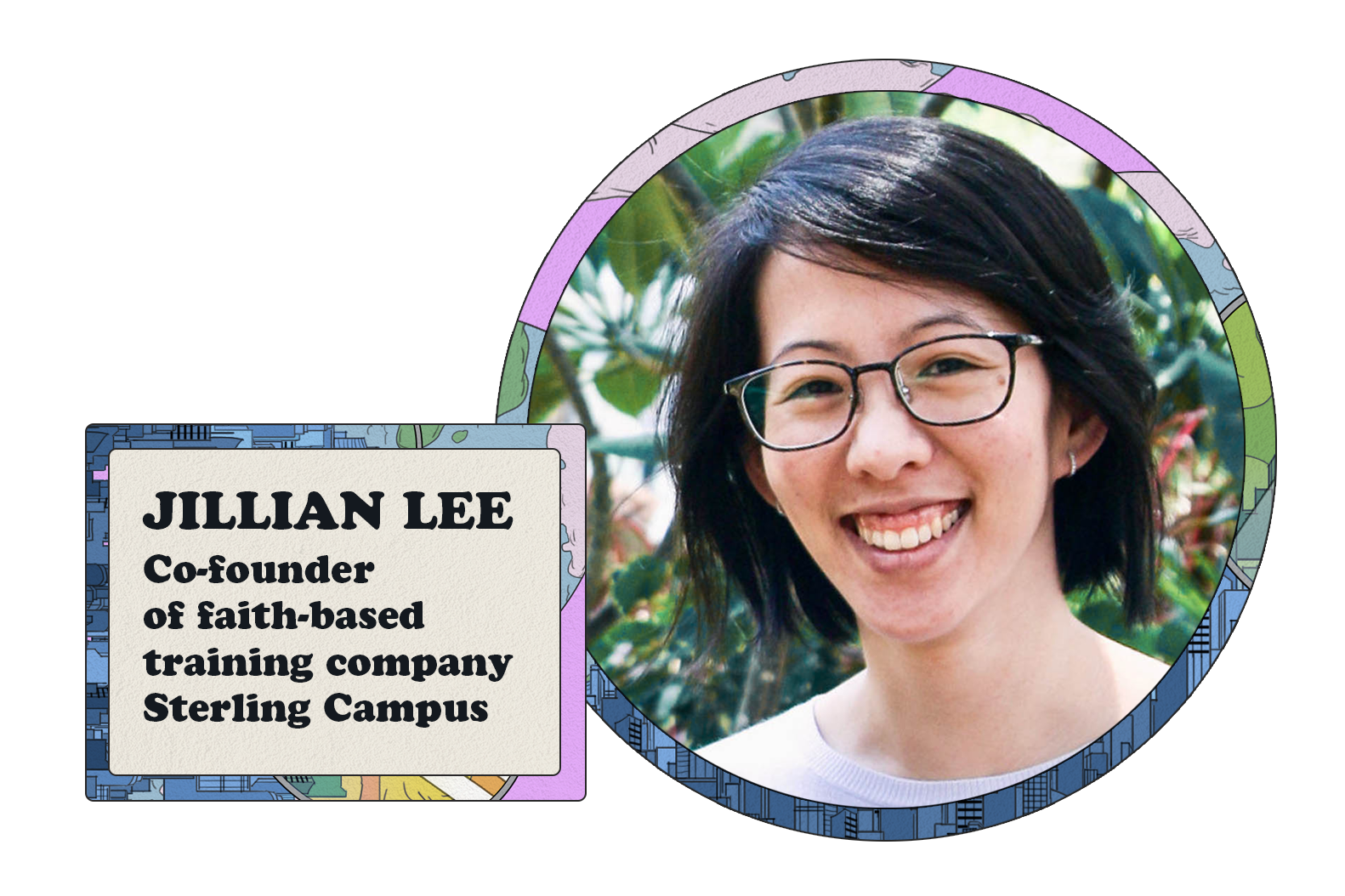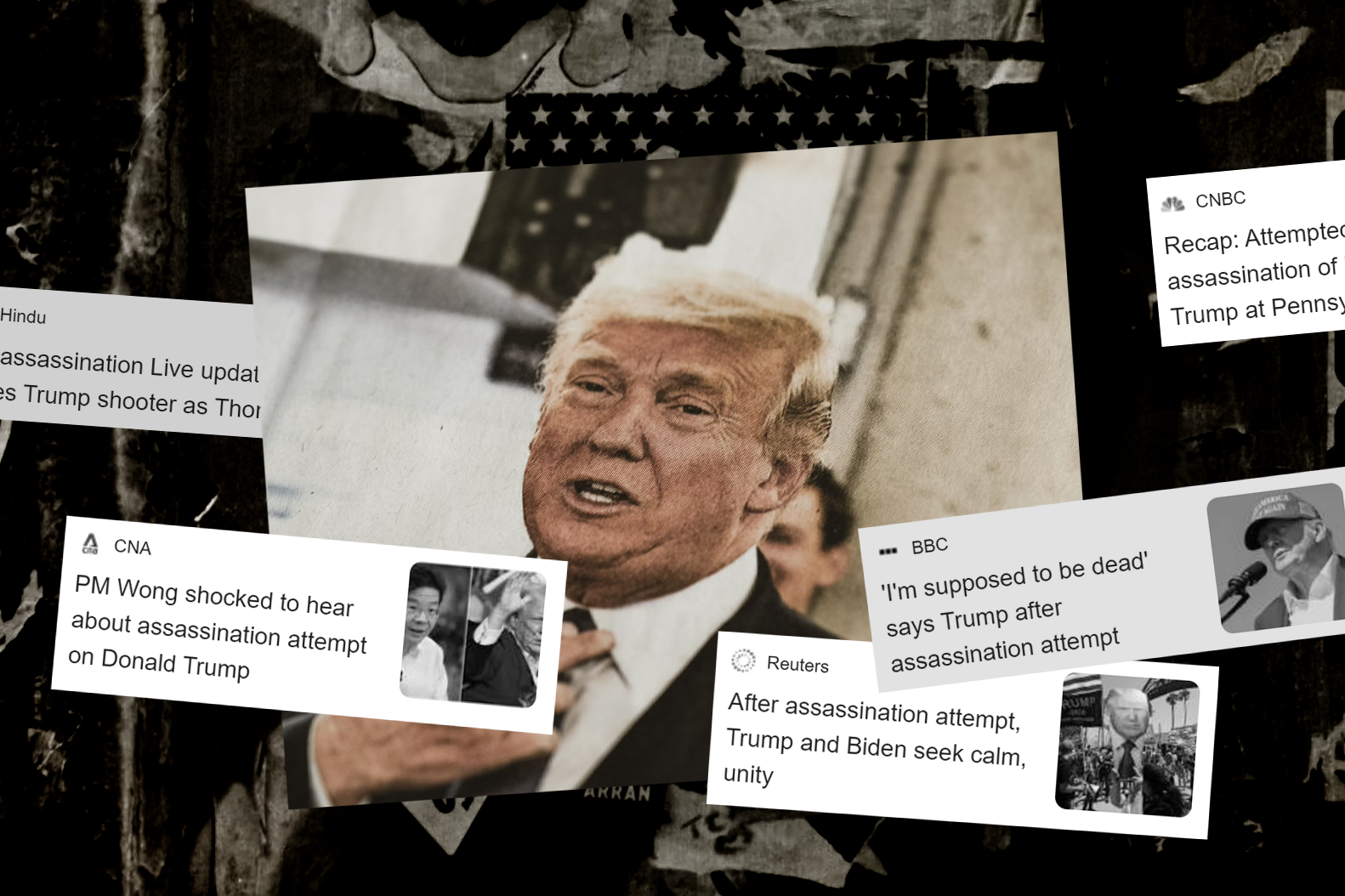Our Singapore story is founded on pragmatism and meritocracy.
We went from a poor fishing port struggling for independence, to a bustling metropolitan city. Rags to riches.
As Singaporeans, we work hard to create our own destiny and future. All to reach the 5 Cs: comfort, convenience, cash, cultural capital, credibility. This is the typical end goal of the Singaporean worldview and system.
It was the same system Jillian Lee found herself in as a teacher as she began questioning the purpose of her work: “Why do I keep on just having these students come through the A-Levels year after year?
“So that they can go to university, get a job, maybe get married and have kids — and then send the kids back into the same system such that it starts all over again?”

That was the line of thought that eventually saw Lee embark on a faith journey and eventually co-found faith-based training company Sterling Campus.
After a season of questioning and praying about the purpose of work and education, she took the opportunity to teach overseas. There, Jillian rediscovered her faith and also began to see God’s heart for education in a new light.
Education was no longer about the paper chase for Lee, but “about equipping young people by preparing them with all the foundations that they need intellectually, spiritually, emotionally and morally to enter into society and make an impact.”
With how her life changed from a shift in perspective on work and education, Lee became convinced of the importance of having the right worldview.
That is why, speaking at the Biblical Worldviews Foundations webinar conducted by The Capstone Collective on 15-20 December 2021, she sought to elucidate what makes up a worldview.
WHAT IS A WORLDVIEW?
Quoting James Sire, Lee began by defining a worldview as “an orientation of the heart“.
Contrary to common belief that a worldview has to do solely with the mind, Lee believes a worldview has more to do with our heart’s deepest motivations — “where our hearts are inclined”.
Indeed, reading from Proverbs 4:23, she likened the heart to being the “CEO of our thoughts, emotions, will and desires”. In that light, every person has a worldview and is operating from it whether we’re aware of it or not.
Lee also explained that our worldviews are also formed and informed by certain Big Questions we ask and answer in life.
- Who/what is God?
- Who/what is Man?
- What’s the end goal of life?
- What is right and wrong?
- What is my calling?
- How should I live?
Indeed, worldviews give shape and direction to our lives. “They’re not something we think about often, but we think with them,” Lee mused.
Worldviews also have huge implications on the way we think about society, culture and life.
For instance, Christians in Singapore may find that the Singaporean worldview can be extremely detrimental to our relationship with God, noted Lee.
“I know of many youths who are angry with God, because they’re like, ‘God, I prayed. I served in church, I’ve done this. How come You don’t answer my prayers?’” she shared.
Lee’s point was that, without even realising it, we often bring aspects of our culture like familiarity with transactions, efficiency and immediate gratification into our relationship with God.
“Is there a better story for us to live by?”
That is thus how a worldview can clash with the reality of God’s nature and character.
Seeing that a rags-to-riches story like Singapore’s and a life of hustling and paper-chasing are not narratives believers should live by, Lee found herself asking: “Is there a better story for us to live by?”
She eventually found a better overarching narrative for life; a story that begins with creation and ends with restoration — God’s story.
What is God’s story? To answer that question (and establish a biblical worldview) Lee brought attendees through a brief overview of the entire Bible through six acts.
GOD’S STORY IN 6 ACTS
Act I: Creation
Creation was created “good”.
Seven times in Genesis, observed Lee, God saw that His creation was “good”. And when God looked at all that He had made, He said it was “very good”.
Lee explained that the first two chapters in Genesis are “images of flourishing”; we can see there originally was an intimate relationship between God and His creation.
“It was a world that was designed for abundance and flourishing goodness, relationship and partnership with God,” shared Lee.
That should inform the way Christians see life, work and the natural world since we are still called to tend it and keep God’s creation.
Indeed, Lee believes we are to bring it to its “fullest potential, to cause things to flourish so that His goodness, order, beauty and creativity will spill out into the rest of the world.”
Act II: Fall
Lee also explained that Adam and Eve were meant to be priests in this world.
But because they disobeyed God, sin entered the world and infected every single part of creation, from inside to out.
What was once good is now broken. “Work became toil, relationships became cursed,” said Lee.
Indeed, the effects of sin manifest in us and our relationships today through guilt, shame, jealousy, anger and bitterness.
“On a larger scale, we see exploitation and toil, death, injustice,” Lee added.
Act III: Covenant
At this point, Lee raised another question: “If you were God, what would you do?”
Ctrl-Alt-Del? Turn the whole thing off? But God didn’t do that.
Lee reflected that because of God’s goodness and mercy, instead of obliterating everything, He gave mankind promises to hold onto, binding Himself even more to humanity.
Choosing a people for Himself, God’s desire was that they would imitate Him and draw other nations to Him.
“But they turned their backs on Him, just like Adam and Eve did,” said Lee. People rebelled and disobeyed repeatedly.
Throughout history, God called His people back to Himself. He sent prophets to warn the people and lead them back to Him. But they strayed further and further away.
To discipline them, God allowed His people to go into exile where some would come to their senses. Even in exile, God was always working to bring His people back to Himself.
Again, God promised a saviour for His people in exile — a Messiah who would restore Israel. And so Israel waited.
Act IV: Christ
After centuries, a Messiah does arrive. But not in the form that people expected. He was not a political ruler, king or a prince.
“He came as a young baby, helpless and vulnerable,” said Lee. And this young baby was named Jesus.
Then, when Jesus is about 30 years old, He transforms water into wine. He casts out demons and performs many other miraculous acts in Israel. Surely, He had to be the Messiah.
But something unexpected happens: Jesus is crucified and killed. After centuries of expectant waiting, hope seems to have been crushed. But when all seemed lost — Christ resurrected after three days.
“From the disciples’ point of view, it really looks like the Messiah has finally come and the kingdom is going to be restored,” said Lee. They eagerly ask if Jesus would restore the kingdom at this time (Acts 1:6).
Instead, Jesus says to them, “But you will receive power when the Holy Spirit comes on you, and you will be my witnesses in Jerusalem, and in all Judea and Samaria, and to the ends of the earth” (Acts 1:8).
In other words, the disciples themselves would be involved in the work of restoration in the kingdom that is already here, but not fully consummated yet.
Act V: Church
So the disciples waited for the Holy Spirit. After they received it at Pentecost, they went out into the world and proclaimed the gospel to all people, teaching the people God’s Word.
Today we’re called to do the same, affirmed Lee. We are to participate in God’s restorative kingdom work, restoring what is broken in society in God’s love, grace, mercy and justice.
Act VI: Restoration
Lee concluded by sharing that believers now look forward to when Christ will come again. That is when He will bring the story to a close — but also to a new beginning.
“It’s going to be a time where all things are restored back into fullness again, and our restless hearts will find rest in Him again,” she affirmed.
“We don’t have to pretend to be somebody we’re not, we don’t have to perform. God will be all in all.”
THE BIBLICAL WORLDVIEW
This is God’s grand narrative; the story He invites us to be a part of. But where do we find ourselves in this story?
Lee explained that we’re in between the first and second coming of Christ.
“We point people to the coming King and His coming Kingdom,” she affirmed, speaking of the task at hand for all Christians.
Lee also shared that, for her, “it is a great privilege” to partner with God in His work of reconciliation in various spheres of society and life.
She believes it’s all about partnering with God, seeing the world through His eyes and asking Him: “How are you calling me to restore the broken things and systems in this place?”
As I listened to Lee and reflected, I found myself encouraged and fired up. But what was I supposed to do now?
I felt small and insignificant at God’s grand task before me. Thankfully, my takeaways from the breakout room discussions were very encouraging:
- Everyone has a unique calling
- We need the grace of God, always
“Everyone is made different. Everyone has different gifts, everyone is placed in a different place in their own lives,” said the facilitator in my breakout room.
He elaborated that only I can do what God has called me to do, right where I am.
I was also encouraged that experiencing doubt along the way is normal — but that should be a reminder to go back to Jesus and depend on His grace for what we are called to do.
God is the author who has already written the ending; I can have peace as I rest in Him.
Life can get overwhelming and confusing. But I take heart knowing that my story can fit into God’s story, and that He gifts me the privilege to play a part.
God is the author who has already written the ending; I can have peace as I rest in Him.
I can have hope and courage as I seek to bless His world!
- What is your worldview (you might ask yourself some Big Questions)?
- How does your worldview align with the biblical worldview?
- What parts of the way you see life might require realignment with God’s story?
- What is one practical thing you can do to begin living out your unique calling for God?









